FIC - CALLING ON ALL NON-PROFIT ORGANISATIONS: REGISTRATION DEADLINE WITH THE FINANCIAL INTELLIGENCE CENTRE AND FILING ANNUAL RETURNS - 29 September 2023

- INTRODUCTION
The Financial Intelligence Centre (FIC) is tasked with the coordination of Namibia's Anti-Money Laundering, Combatting the Financing of Terrorism and Proliferation (AMU/CFI/CPF) activities. In furtherance of this mandate, the FIC supervises Non-Profit Organisations (NPOs), amongst other sectors, as per the Financial Intelligence Act, 2012.
Faith Based Organisations (FBOs), religious bodies and NPOs involved in charitable services are all required to register with the FIC no later than 29 September 2023. There have been numerous publications since 2020 encouraging NPOs to register with the FIC. The FIC will take measures to enforce compliance by all non-complying NPOs. Such enforcement may include fines, orders to cease operations and instructing financial service providers deny non-complying NPOs access to designated services, in an effort to reduce further risk exposure to the financial system, amongst others. - REGISTRATION REQUIREMENTS
The following are the FlA registration requirements:
2.1 Identification details (passport/ID) and address details of the Founder(s) of the NPO. Where founder(s) is a legal person or arrangement (e.g. trust), present incorporation or registration details of such founding entity(ies),
2.2 Registration of the NPO as a section 21 company, where need be;
2.3 if NPO is registered in other jurisdictions, proof of such foreign registration;
2 4 list of the NPO's branches both inside and outside Namibia;
2.5 proof of authority or license to operate as an NPO. For example, registration with the National Welfare Board, in terms of the National Welfare Act, 1965 (Act 79 of 1965). Foreign NPOs must demonstrate Similar authority from relevant authorities;
2.6 governing and incorporation documents such as a charter, constitution, memorandum of association or articles or other governing documents deemed relevant by the FIC governing the NPO's existence and operations. Such governing documents must specify, amongst others, the following information about the NPO:
a. current name and any previous name(s) of the NPO;
b. address and contact details of the NPO where NPO can be served documents. As per the FlA, an NPO must have a registered local office for all communications and service of legal proceedings;
c. the nature of services, purpose and object of the NPO;
d. particulars of the control/governance structure such as management, administration and operation frameworks. Organograms are usually helpful; and the functions and powers of the Board and/or Management Committee.
2.7 recruitment of senior management: Depending on NPO risk profile, operations and governance structure, the FIC may further request for: (1) Identification and CVs of senior NPO employees; (2) procedures for the appointment of such senior employees; and (3) any other information such as police Clearance certificates and IC records;
2.8 identification (passport/ID), address and contact particulars of the NPO's Board and/or Management Committee members;
2.9 demonstration that Board and/or Management Committee Members are fit and proper. NPOs must present valid police clearance certificates and ITC records for such members. These certificates and ITC records may take time to source, NPOs are therefore cautioned to apply for these documents as early as possible, in view of registration timelines. Depending on the NPOs risk profile, the FIC may provisionally register NPOs with a lower risk profile without such police clearance certificates and ITC records. In this regard, the FIC may direct such NPOs to obtain and present such information in a specified time while provisionally registered. Registration in such cases will remain provisional until all requirements are met in the given timeframe;
210 state the source(s) of funding of the NPO. if not stated in any of the above. FIC may request for proof of such sources of funding or related information;
2.11 a policy document or standard operating procedures to manage terrorism financing risks. NPOs must implement controls to reduce risks of abuse of its services or programs, finances and resources. The FIC helps with guidance in this regard, at no cost, when so requested. NPOs should be guided by Guidance Notes 12 and 13 of 2023 in this regard. These guidance notes are on the FIC website (https://www.fic.na/index.php?page=2023-guidance-notes). The said documents must, at a minimum, speak to the following:
a. confirm the identity, credentials and good standing of donors and beneficial owners: NPOs must have controls to gain reasonable assurance of a donor's good standing. This is necessary This is necessary for the NPO to gain assurance that such persons are not involved, nor are they at risk of abusing the charitable causes, operations or funds to advance financial crimes such as tax evasion, dealing in prohibited substances, or influence NPO activities to support terrorist activities etc.,
b. managing risks of beneficiaries: Where the NPO is involved in funding and/or resourcing other NPOs, arrangements, persons (or any other beneficiaries), the funing/donor or resourcing NPO has a responsibllity to gain assurance that such funds or resources being availed are not to advance financial crimes and terrorist activities,
c. transparency around founders, donors, beneficiary information: NPOs need to ensure that identification and relevant information of all their donors beneficial owners and beneficiaries is publicly available or can be readily accessed by the public and competent authorities such as the FIC, Law Enforcement and licensing and registration bodies such as Government Ministries. Such records be kept for a minimum period of five years, unless instructed by competent authorities to retain same for longer periods;
d. mandatory sanctions screening: ensure to screen all donors, beneficiaries, beneficial owners and relevant stakeholders against the United Nations Security Council (UNSC) sanctions lists before any services are availed, for purposes of combatting the financing of terrorism and the funding of Proliferation activities as per FlA section 24, FIA Regulations 1, 15 as well as section 25 of the Prevention and Combating of Terrorist and Proliferation Activities Act, 2014 (Act No. 4 of 2014). The updated sanctions lists can be found by accessing the following link: https://www.un.org/securitycouncil/content/un-sc-consolidated-list;
e. maintaining records: this should be records of information on the activities, purpose and objective(s) of the NPO. The activities, purpose and obiective(s) could be reflected on the founding or incorporation documents of the NPO. Such and all NPO records should be kept for a period of five years unless instructed to keep same longer. Such should be readily availed to competent and investigative authorities; and
f. accounting for all NPO resources, receipts and expenditure: having appropriate controls in place to ensure that all resources and funds are fully accounted for and used in a manner that is consistent with the legitimate services, activities, purpose and objective(s) of the NPO. Funds should only be moved or transferred via regulated systems, such as banking systems, which leave an audit trail of the transaction. Moving/transferring funds through cash or informal mechanisms is high risk and should be limited to exceptional circumstances.
2.12 nomination of one person (within the NPO's management) who will be the Compliance Officer. This has to be someone with the relevant seniority in the NPO and must be in a position to lead the implementation of the compliance systems within the NPO as explained herein. There may not always be a need to create a new position as the duties of such officer can be assigned to an existing position/staff member. His or her contact details would need to be availed to the FIC upon registration and he/she will be the point of contact of the FIC.
A registration form must be duly completed and submitted to the FIC, along with information stated above. The registration form is marked Annexure A to Revised Directive 04 of 2023 (pages 11 - 18). The said Directive is available on the FIC website, under 'Publications' or via the following link: Revised Directive No 4 of.2023-NPO_FIC.Registration Regime.pdf [https://www.fic.na/index.php?page=2023-directives]
The FIA Regulations further require that NPOs update the FIC should they make any changes to information supplied upon registration, within 14 days of making such changes. - PREVIOUSLY REGISTERED NPOs
If an NPO is previously registered with the FIC, such NPO needs to update and verify its particulars to meet updated registration requirements, in line with the June 2023 FIA amendments. - REGISTRATION UNCERTAINTIES
For NPOs not certain if they should register, they are required to engage the FIC, as per section 35(A)(2/b), for the FIC to assess whether such NPO meets the criteria to register. The FIC will provide a Clearance Certificate to all NPOs that need not comply with the FlA, as per such provision; and - FILING AN ANNUAL NPO RETURN
FBOs, religious bodies and charitable NPOs are further required to file Annual Returns with the FIC. Such return is readily available from the FIC and POs are required to engage the FIC to obtain such. - CONCLUSION
FIC registration is free and can be finalised within a week, provided all requirements are met. A letter confirming registration is issued to an entity when registration is completed.
Z. BARRY
ACTING DIRECTOR: FINANCIAL INTELLIGENCE CENTRE
25 AUGUST 2022
---
Click on the following link to download the full notice from the Financial Intelligence Centre (FIC) Namibia <https://www.civic264.org.na/images/pdf/2023/8/FIC_-_Calling_on_All_NPOs_Registration_Deadline_with_the_FIC__Filing_Annual_Returns_-_29_September_2023.pdf>
Stay Informed
When you subscribe to the blog, we will send you an e-mail when there are new updates on the site so you wouldn't miss them.
